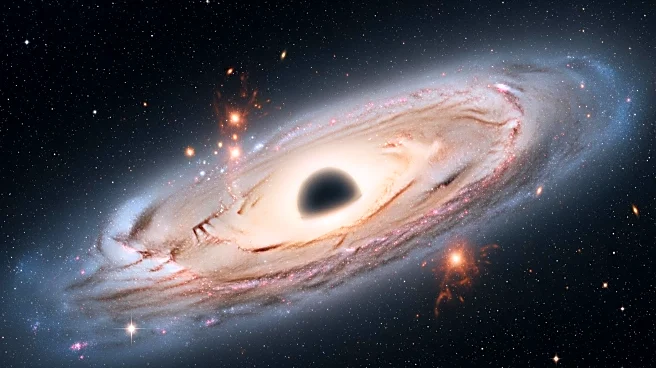What's Happening?
Recent advancements in black hole observations have prompted scientists to reconsider aspects of Einstein's general theory of relativity. The Event Horizon Telescope (EHT) collaboration has captured images
of supermassive black holes, revealing the 'shadow' of these cosmic entities. This shadow provides a new method to test the physics of black holes, which have long been predicted by Einstein's theory. Researchers, including Prof. Luciano Rezzolla from Goethe University Frankfurt, are exploring alternative theories that might explain black holes differently, potentially requiring matter with unique properties or even violating known physical laws. The team has developed a framework using three-dimensional simulations to compare how different theoretical models of black holes would appear in images, aiming to identify patterns that could challenge or confirm Einstein's model.
Why It's Important?
The ability to test Einstein's theory of relativity using black hole shadows represents a significant advancement in astrophysics. If alternative theories prove accurate, it could revolutionize our understanding of gravity and the universe. This has implications for theoretical physics, potentially leading to new models that better explain cosmic phenomena. The research could also impact technology, as improved observational techniques are developed to capture high-resolution images of black holes. Such advancements may enhance our ability to explore other cosmic mysteries, influencing scientific research and education. The findings could also affect public policy regarding funding for space exploration and scientific research.
What's Next?
Future observations with enhanced technology are expected to provide more definitive tests of competing black hole theories. The EHT collaboration plans to expand its network by adding more observatories and potentially a space-based radio telescope, which would significantly increase resolution. Achieving an angular resolution of less than one millionth of an arcsecond is necessary to distinguish between different theoretical models. As technology advances, scientists anticipate being able to conduct more precise tests, potentially leading to groundbreaking discoveries in the field of astrophysics.
Beyond the Headlines
The exploration of black holes not only challenges existing scientific theories but also raises ethical and philosophical questions about our understanding of the universe. The pursuit of knowledge in this area reflects humanity's quest to comprehend the cosmos, which could influence cultural perspectives on science and technology. Additionally, the collaboration between international research institutions highlights the importance of global cooperation in scientific endeavors.









